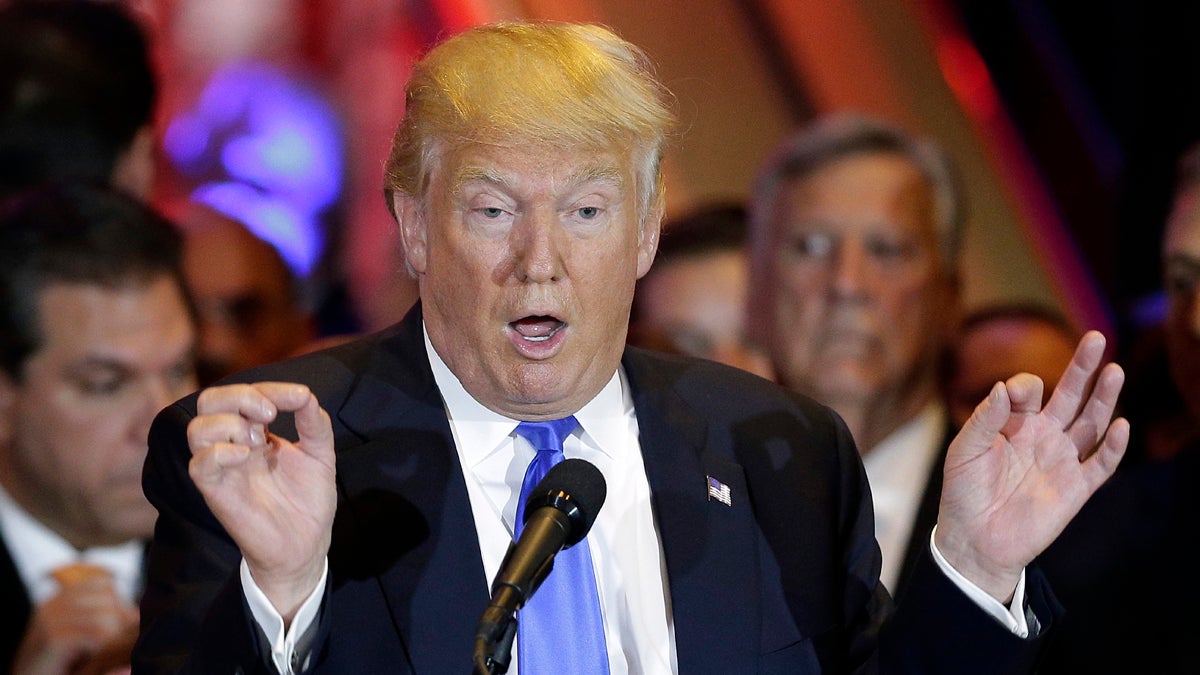Analysis: Trump has most of Pennsylvania’s ‘uncommitted’ delegates
Listen
Republican presidential candidate Donald Trump speaks during a primary night news conference
Donald Trump won big in the Pennsylvania primary, getting 57 percent of the popular vote. But he did even better picking up delegates.
Much has been said about how most of Pennsylvania’s delegation will go the Republican National Convention uncommitted, but my analysis finds Trump can likely count on the first-ballot votes of 52 of the state’s 71 delegates — that’s 73 percent.
As I’ve explained here before, only 17 of the state’s 71 delegates go to the winner of the popular vote. The rest, 54 in all, are elected directly by voters and are unbound by the popular vote. By my read, Trump will get 35 of those 54.
Under Pennsylvania’s peculiar rules, candidates for delegate appeared on the ballot under their own names, with no indication as to which presidential candidate, if any, they favored.
But the Trump campaign was so effective in getting its supporters on the ballot and elected as delegates that many of those technically unpledged delegates elected Tuesday are personally committed to Trump.
WHYY and other news organizations contacted the 162 candidates across the state before the primary and published the information we could get on their voting preferences.
I’ve gone through the 54 winners of the delegates’ election and looked for those in one or more of three categories:
Those who said they were firm Trump supporters.
Those who pledged to vote for the winner of the popular vote in their congressional districts. (It seems Trump won at least 17 of 18 — no official numbers on that yet.)
Those endorsed on the official Trump delegate slate.
Delegates in one or more of those categories amount to 35 of the state’s 54 uncommitted delegates.Add those to the 17 pledged delegates Trump won with the popular vote, and he has 52 of the state’s 71 delegates on the first ballot — 73 percent.
How’d they do it?
The Trump campaign has been criticized for its ineffective field organizing in other states. Maybe they finally got their game together in Pennsylvania.
I spoke to Joyce Haas, the vice chair of the state Republican Party, who was an uncommitted candidate for delegate in the 5th Congressional District in Central and Western Pennsylvania.
She lost narrowly. All three candidates endorsed by the Trump campaign won.
She said the Trump campaign put out a mailing with their slate of delegate candidates on it.
“The mailing was effective,” Haas told me. “People did carry it with them to the polls, and the Trump campaign in the area had done some robocalls, so that also had an effect.”
One Republican in the Philadelphia suburbs told me she got three robocalls, including one from Ivanka Trump.
The enthusiasm edge
Another congressional district where the Trump slate ran the table was the 17th in Northeastern Pennsylvania.
There, three women from three different counties formed a pact to win as Trump supporters.
“It was really all grass roots,” one of the trio, Lee Stover, told me.
“The Trump campaign did not pay for any robocalls for me or any of the other candidates in our district,” Stover said. “The only thing they contributed was a hand card for Election Day. It was very nice, but it was up to us to get poll workers and get these cards out.”
Stover paid $600 out of her own pocket for for two robocalls.
Is this over?
The 35 uncommitted delegates I assign to Trump in my analysis could be off a bit, if someone rethinks his or her position, or I’ve misread someone’s stated intentions.
And there are 10 weeks till the convention. The 54 delegates are technically uncommitted. Any of them could change their minds. But I don’t expect much to change here.
I asked Lee Stover what the chances are that she could vote for anyone besides Trump.
“Me? Probably zero,” she said. “During the time I was running, I did have two pretty serious calls from the Cruz campaign trying to turn me, but I just said I wasn’t interested.”
WHYY is your source for fact-based, in-depth journalism and information. As a nonprofit organization, we rely on financial support from readers like you. Please give today.


